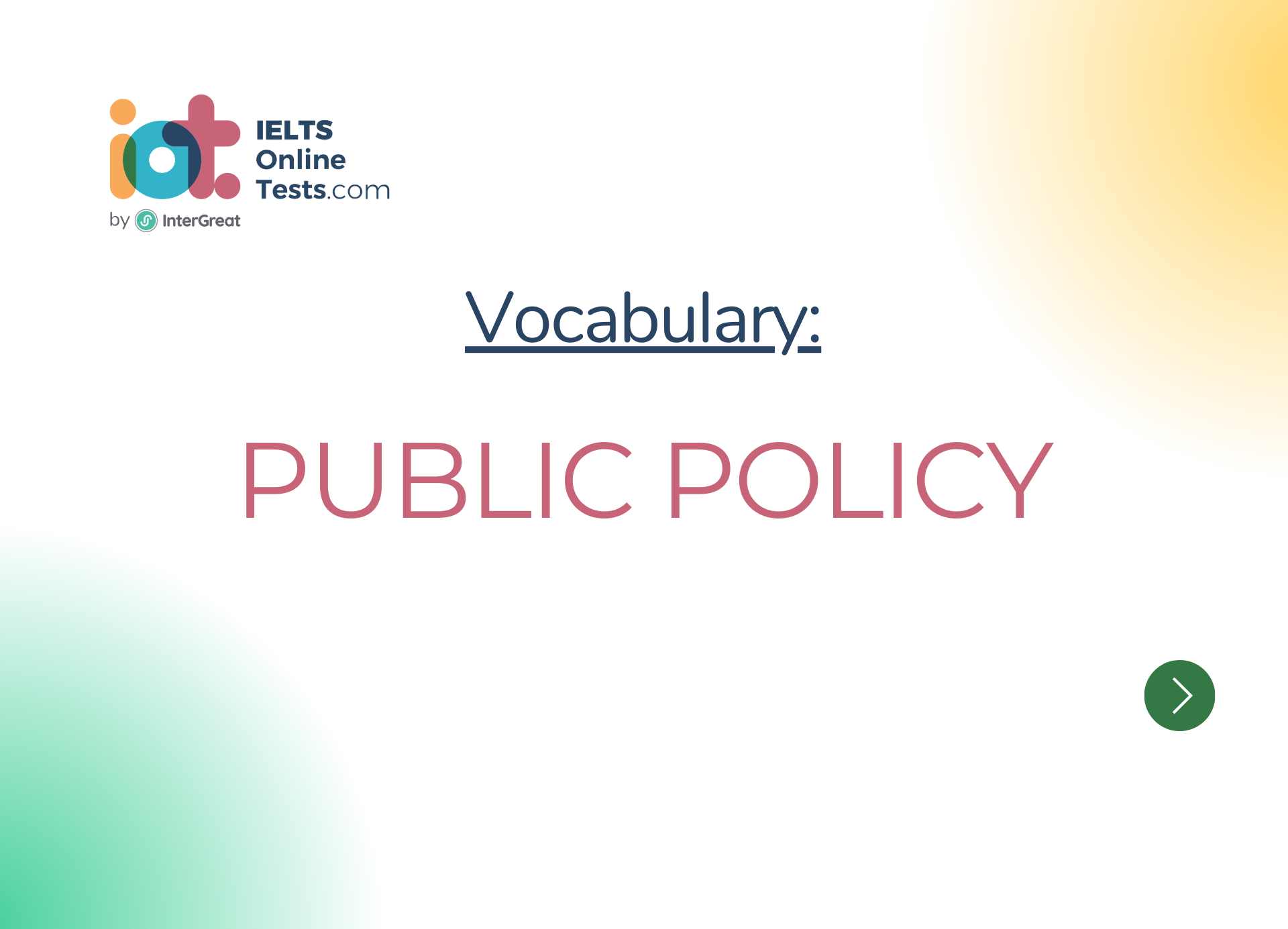
Public policy
Below is a detailed list of vocabulary related to public policy, along with their definitions. Familiarizing yourself with these terms will enable you to discuss various aspects of public policy and governance during the IELTS exam or any discussions related to policymaking and implementation.
Public Policy:
- Definition: The course of action or set of principles adopted by governments or public authorities to address societal issues and achieve specific goals.
Policy Analysis:
- Definition: The process of evaluating and assessing the impacts, costs, and benefits of different policy options before making decisions.
Policy Formulation:
- Definition: The development and creation of proposed policies, including identifying problems, setting objectives, and exploring potential solutions.
Policy Implementation:
- Definition: The stage where policies are put into action, involving the execution of plans and the allocation of resources.
Policy Evaluation:
- Definition: The assessment of policy effectiveness and outcomes to determine if the desired goals have been achieved.
Policy Advocacy:
- Definition: Efforts by individuals or groups to promote or support specific policies and influence policymakers.
Policy Change:
- Definition: The process of modifying existing policies to adapt to new circumstances or address emerging challenges.
Policy Impact:
- Definition: The effects and consequences of policies on individuals, communities, and the overall society.
Public Interest:
- Definition: The welfare and well-being of the general public, considered as a primary concern in policy decision-making.
Policy Brief:
- Definition: A concise document that provides essential information and recommendations to policymakers on a specific issue.
Policy Cycle:
- Definition: The stages of policymaking, including agenda-setting, policy formulation, implementation, and evaluation.
Evidence-Based Policy:
- Definition: Policies that are developed and informed by rigorous research, data, and analysis to ensure effectiveness.
Policy Instrument:
- Definition: The specific tools, methods, or mechanisms used to implement a policy, such as regulations, incentives, or subsidies.
Social Policy:
- Definition: Policies designed to address social issues, such as healthcare, education, and welfare.
Economic Policy:
- Definition: Policies related to managing and influencing economic activities, such as monetary and fiscal policies.
Environmental Policy:
- Definition: Policies aimed at protecting the environment and natural resources, addressing issues like pollution and climate change.
Foreign Policy:
- Definition: Policies that guide a country's interactions and relations with other nations.
Health Policy:
- Definition: Policies focused on healthcare systems, public health, and the delivery of medical services.
Education Policy:
- Definition: Policies related to the organization and governance of educational institutions and programs.
Urban Policy:
- Definition: Policies aimed at addressing the challenges and opportunities of urban areas, such as housing and transportation.
Criminal Justice Policy:
- Definition: Policies concerning the prevention, control, and punishment of crime, as well as rehabilitation and victim support.
Foreign Aid:
- Definition: Assistance given by one country to another in the form of financial support, resources, or expertise.
Policy Environment:
- Definition: The broader social, economic, and political context in which policies are formulated and implemented.
Policy Dialogue:
- Definition: The exchange of ideas and discussions between policymakers, stakeholders, and experts to inform policymaking.
Policy Stakeholders:
- Definition: Individuals or groups who have an interest in or are affected by the outcomes of a specific policy.
Policy Trade-Offs:
- Definition: The recognition that pursuing one policy objective may come at the expense of another due to limited resources or conflicting goals.
Regulatory Policy:
- Definition: Policies that involve the creation and enforcement of rules and regulations to govern specific industries or activities.
Policy Innovation:
- Definition: The introduction of new and creative policy approaches to address complex problems.
Policy Consensus:
- Definition: Agreement and support among key stakeholders and policymakers regarding a particular policy approach.
Policy Failure:
- Definition: The occurrence when a policy does not achieve its intended objectives or has unintended negative consequences.
As you review and practice using these vocabulary words, make sure to understand their meanings in different contexts and be able to incorporate them effectively into your discussions or written responses for the IELTS exam.




